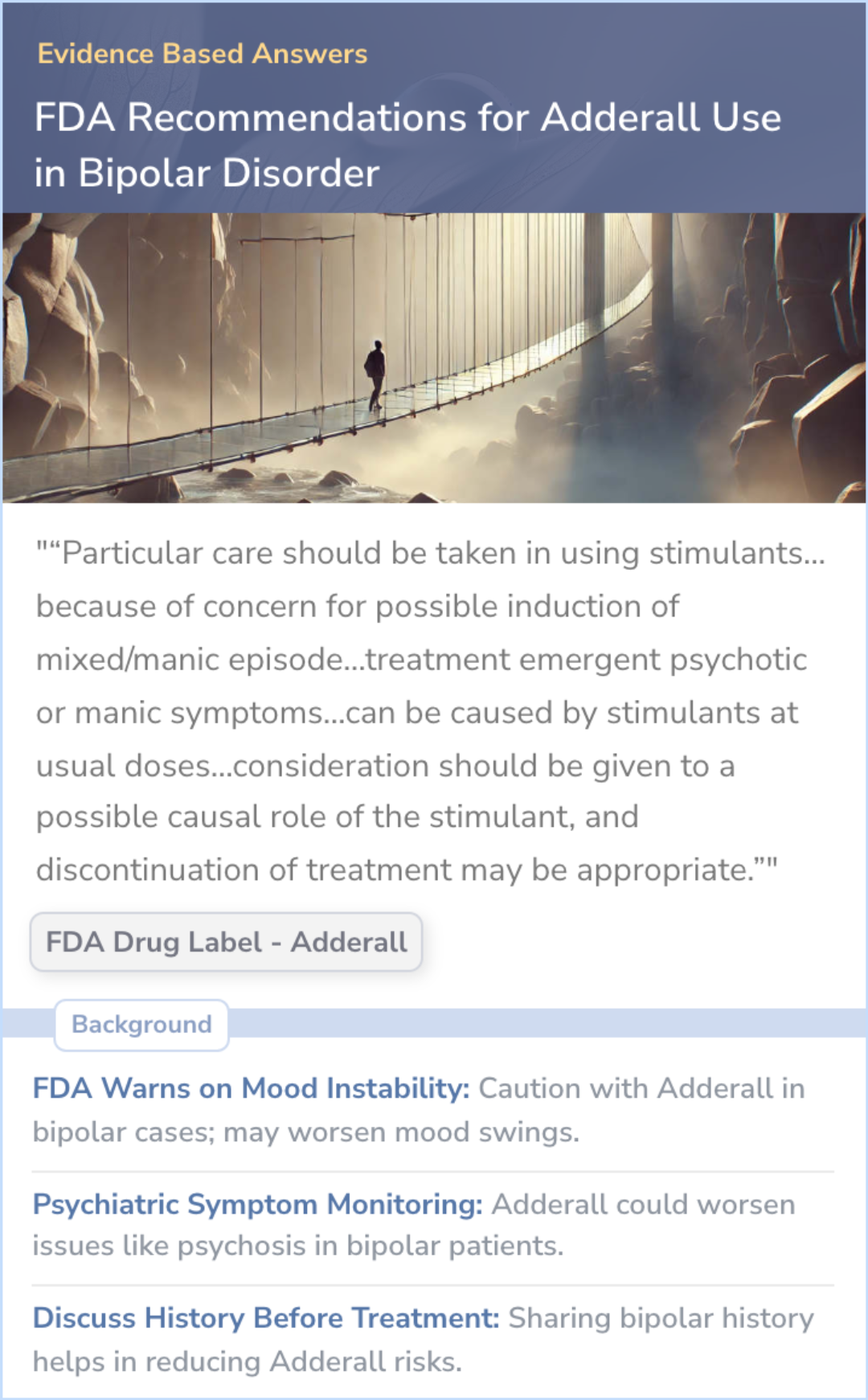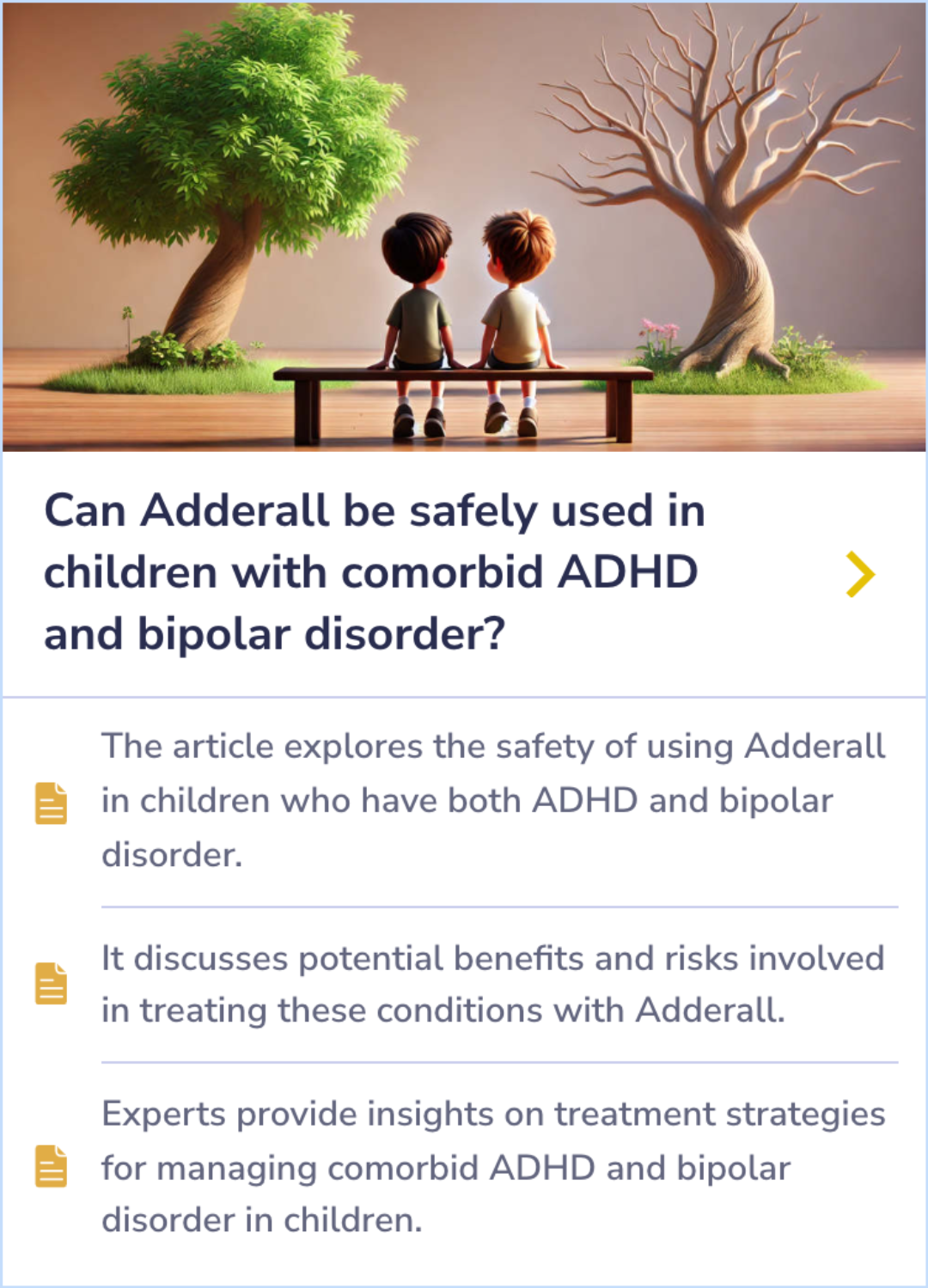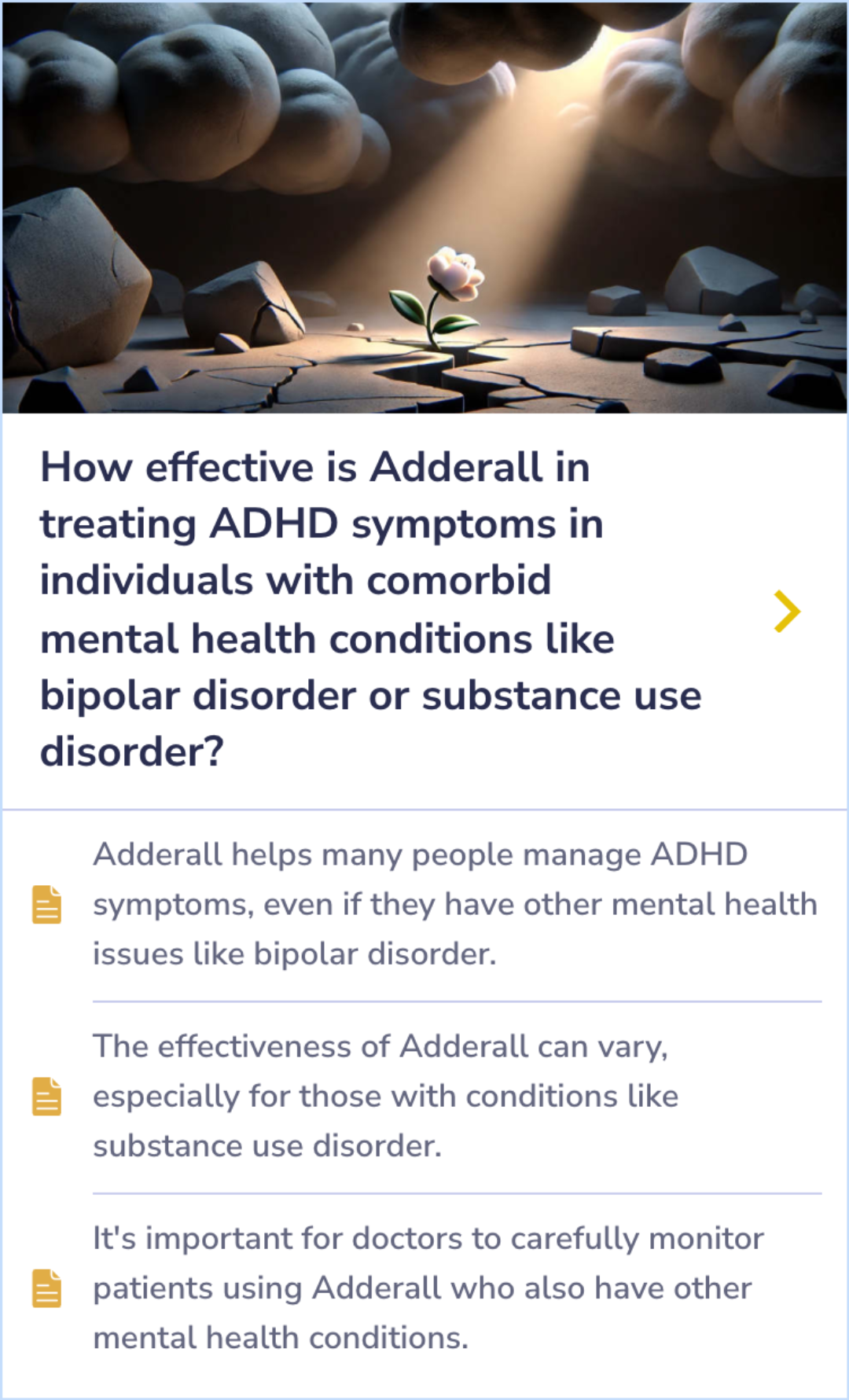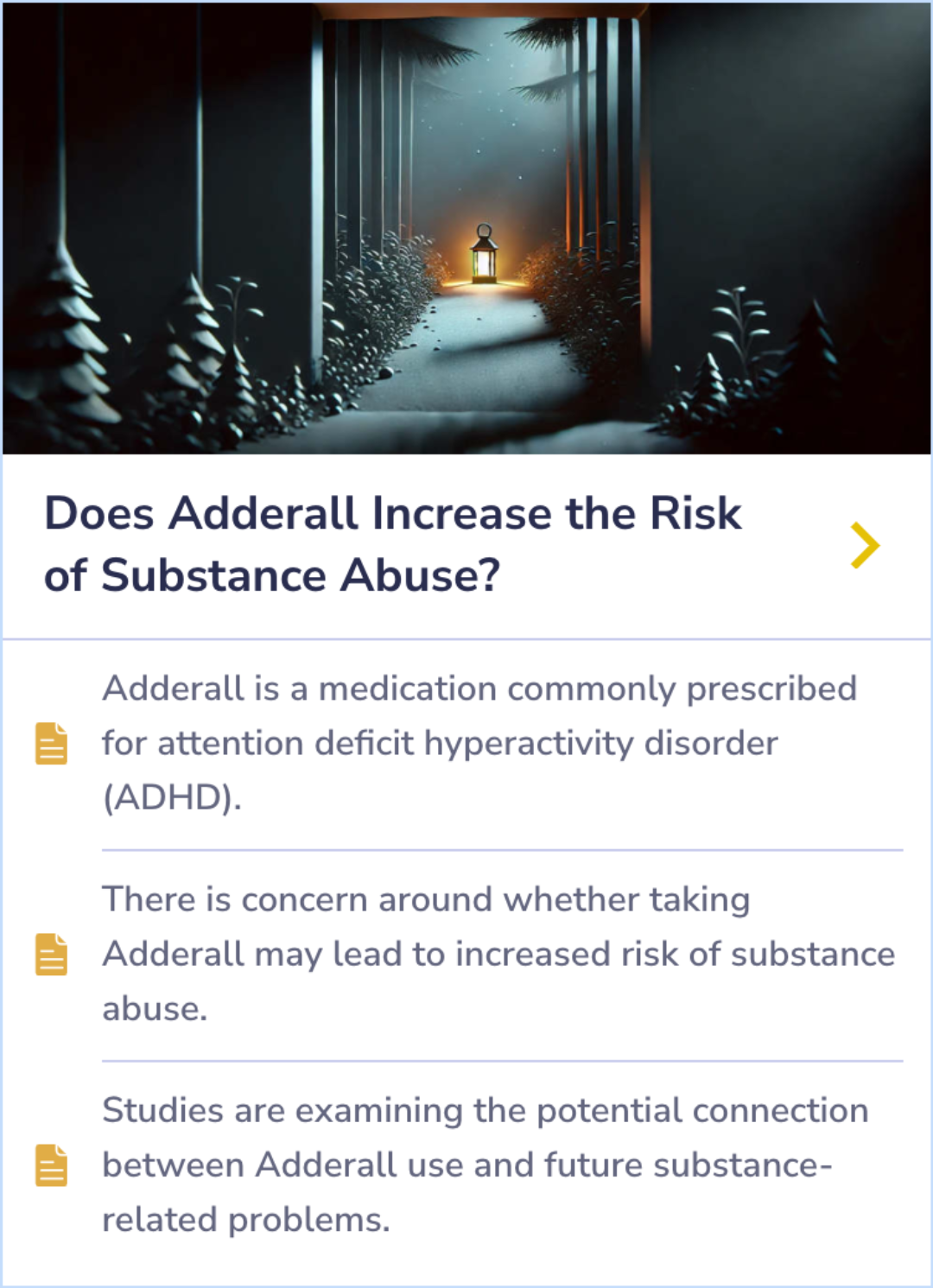Adderall
Evidence Based Answers
What does the FDA say about Adderall and Bipolar Disorder?
The FDA advises against the unmonitored use of stimulants like Adderall in individuals who have or are at risk of bipolar disorder due to potential mood swings or unstable mood. Comprehensive assessments of patient history are vital.
Click to explore a section:

Combined, these slides emphasize FDA guidance on evaluating bipolar disorder risks carefully before considering Adderall, highlighting assessment and monitoring requirements.
FDA Drug LabelAdderall and Bipolar Disorder
The FDA-approved label advises caution when using stimulants, like Adderall, to treat ADHD in patients who also have bipolar disorder. This is due to concerns about inducing manic episodes. Patients should be carefully screened for bipolar disorder risk, particularly if they show depressive symptoms.
The label notes that stimulants can cause psychotic or manic symptoms, such as hallucinations, even at normal doses. If these occur, stopping the medication might be necessary. Such symptoms are rare but have been observed in studies.
The label notes that stimulants can cause psychotic or manic symptoms, such as hallucinations, even at normal doses. If these occur, stopping the medication might be necessary. Such symptoms are rare but have been observed in studies.
"Particular care should be taken in using stimulants to treat ADHD patients with comorbid bipolar disorder because of concern for possible induction of mixed/manic episode in such patients. Prior to initiating treatment with a stimulant, patients with comorbid depressive symptoms should be adequately screened to determine if they are at risk for bipolar disorder; such screening should include a detailed psychiatric history, including a family history of suicide, bipolar disorder, and depression. Treatment emergent psychotic or manic symptoms, e.g., hallucinations, delusional thinking, or mania in children and adolescents without prior history of psychotic illness or mania can be caused by stimulants at usual doses. If such symptoms occur, consideration should be given to a possible causal role of the stimulant, and discontinuation of treatment may be appropriate. In a pooled analysis of multiple shortterm, placebo-controlled studies, such symptoms occurred in about 0.1% (4 patients with events out of 3482 exposed to methylphenidate or amphetamine for several weeks at usual doses) of stimulant-treated patients compared to 0 in placebo-treated patients. "
Source:FDA Drug Label - AdderallFDA Caution on Stimulants in Bipolar Disorder
The FDA emphasizes caution when using stimulants like Adderall in ADHD patients with bipolar disorder. These medications can trigger manic or mixed episodes, worsening mood instability.
Healthcare providers should carefully assess a patient's psychiatric history before prescribing Adderall to reduce risks.
Healthcare providers should carefully assess a patient's psychiatric history before prescribing Adderall to reduce risks.
“
Source Quotes:
Particular care should be taken in using stimulants to treat ADHD patients with comorbid bipolar disorder because of concern for possible induction of mixed/manic episode in such patients.
Monitoring Psychiatric Symptoms
Adderall use may worsen psychiatric symptoms, including psychosis or mania, particularly in patients with bipolar disorder. This risk requires careful monitoring of changes in behavior or mood.
Pre-treatment screenings, including family history, can help reduce risks and ensure adjustments are made if adverse reactions occur.
Pre-treatment screenings, including family history, can help reduce risks and ensure adjustments are made if adverse reactions occur.
“
Source Quotes:
new psychotic symptoms (such as hearing voices, believing things that are not true, are suspicious) or new manic symptoms
Precautions for Patients with Bipolar Disorder
Patients with a history of bipolar disorder or mania should inform their healthcare provider before starting Adderall, including any family history of psychiatric conditions.
Open communication allows healthcare providers to make informed decisions and reduce risks such as mood destabilization.
Open communication allows healthcare providers to make informed decisions and reduce risks such as mood destabilization.
“
Source Quotes:
tell your doctor if you or anyone in your family has or has ever had depression, bipolar disorder (mood that changes from depressed to abnormally excited), or mania (frenzied, abnormally excited mood), motor tics (repeated uncontrollable movements), verbal tics (repetition of sounds or words that is hard to control), or Tourette's syndrome (a condition characterized by the need to perform repeated motions or to repeat sounds or words), or has thought about or attempted suicide.
Potential Benefits and Limitations
The evidence supporting stimulants like Adderall for bipolar depression is limited. Studies do not provide strong data for broad recommendations, emphasizing the need for thorough assessment.
For some patients, stimulants may alleviate symptoms, but clinicians should weigh potential benefits against risks and monitor patient responses closely.
For some patients, stimulants may alleviate symptoms, but clinicians should weigh potential benefits against risks and monitor patient responses closely.
“
Source Quotes:
For bipolar depression, there is some evidence supporting the efficacy of psychostimulant augmentation, but the quality and quantity of studies does not allow for a strong evidence-based recommendation for their use to be put forth (236).
Key Takeaways
Conclusions
The FDA advises caution when prescribing stimulants such as Adderall to patients with ADHD who also have bipolar disorder, as they may provoke manic or mixed episodes, worsening mood swings.
Monitoring is emphasized to detect any mood or behavioral changes. Careful pre-treatment screening and open communication with healthcare providers are crucial to help manage risks and tailor responses to any adverse effects in patients.
Although the potential benefits of stimulants for treating bipolar depression exist, evidence is limited. Clinicians are advised to weigh these benefits against risks, keeping individual patient histories in focus to ensure safer prescriptions.
Monitoring is emphasized to detect any mood or behavioral changes. Careful pre-treatment screening and open communication with healthcare providers are crucial to help manage risks and tailor responses to any adverse effects in patients.
Although the potential benefits of stimulants for treating bipolar depression exist, evidence is limited. Clinicians are advised to weigh these benefits against risks, keeping individual patient histories in focus to ensure safer prescriptions.

Evidence Summary
Adderall Use in Children with ADHD and Bipolar Disorder
Children diagnosed with both ADHD and bipolar disorder present complex treatment challenges. Using Adderall to manage symptoms can offer some potential benefits, but balancing safety is key. The risks involve interactions with mood instability and other bipolar symptoms.
Experts weigh in on how to approach these cases, offering insights into strategies that may stabilize mood while managing ADHD symptoms.
The unique nature of comorbid ADHD and bipolar disorder requires thoughtful consideration when prescribing stimulants like Adderall.
Experts weigh in on how to approach these cases, offering insights into strategies that may stabilize mood while managing ADHD symptoms.
The unique nature of comorbid ADHD and bipolar disorder requires thoughtful consideration when prescribing stimulants like Adderall.
Evidence Summary
Managing ADHD with Adderall and Coexisting Conditions
Adderall often helps people manage ADHD symptoms even when they have coexisting mental health issues like bipolar disorder. However, its effectiveness may differ for those with conditions like substance use disorder. Close supervision by a doctor is key to ensuring Adderall's safe use.
Monitoring is especially important when treating individuals with multiple mental health conditions to maximize benefits and minimize risks.
Monitoring is especially important when treating individuals with multiple mental health conditions to maximize benefits and minimize risks.
Evidence Summary
Exploring Adderall’s Potential Link to Future Substance Abuse
The article highlights the potential link between Adderall, a medication commonly prescribed for ADHD, and future substance abuse concerns. While Adderall can effectively manage ADHD symptoms, some studies question whether its use might increase the risk of substance-related problems down the line.
Research is examining whether individuals who use Adderall, especially over extended periods, may be more prone to challenges with substance use in the future.
Research is examining whether individuals who use Adderall, especially over extended periods, may be more prone to challenges with substance use in the future.


